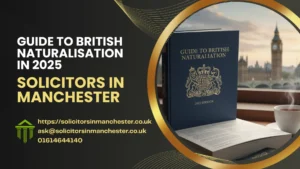From ILR to Citizenship: Your Complete Guide to British Naturalisation in 2025
If you’ve already got indefinite leave to remain (ILR) in the UK, you’re probably thinking about what comes next. For many people, that next step is becoming a British citizen through a process called naturalisation. It’s a big decision that comes with real benefits, from unrestricted travel with a British passport to the right to vote in UK elections.
But moving from ILR to citizenship isn’t automatic. You’ll need to meet specific requirements, gather the right documents, and understand exactly what the Home Office expects from your application. In this guide, we’ll walk you through everything you need to know about making that transition in 2025.

Our immigration lawyers in Manchester are ready to assist you in person or via the phone.
Understanding the Difference Between ILR and British Citizenship
Before you start your citizenship application, it’s worth understanding what actually changes when you go from ILR to full British citizenship.
What ILR Actually Gives You
Indefinite leave to remain lets you live and work in the UK without time limits. You won’t need to renew a visa every few years, and you’re not tied to a specific employer or sponsor. It’s often called “settled status” because it feels permanent.
But there’s a catch. If you leave the UK for more than two years continuously, you’ll lose your ILR status. You also can’t vote in general elections, and you don’t automatically have the right to pass British nationality on to children born outside the UK.
What Changes with Citizenship
British citizenship is permanent. Once you’re naturalised, you can’t lose it by spending time abroad. You’ll be able to apply for a British passport, which opens up visa-free travel to many countries. You can vote, stand for public office, and work in roles that require UK nationality (like certain civil service positions).
Most importantly, citizenship can’t be taken away just because you’ve been living elsewhere. It’s yours for life.
Should You Keep Your Original Nationality?
The UK allows dual citizenship, so you won’t be forced to give up your current passport. However, not every country permits dual nationality. Some nations require you to renounce your original citizenship when you become British. Check with your country’s embassy before applying to avoid any surprises.
When Can You Apply for Citizenship After Getting ILR?
Timing matters when you’re planning your path from ILR to citizenship. The waiting period depends on your personal circumstances.
The Standard 12 Month Wait
Most people need to hold ILR for at least 12 months before they can apply for British citizenship. This gives you time to settle into permanent residency and demonstrate that you’re committed to living in the UK long-term.
During this year, you should keep track of your travel. If you spend too much time abroad, it could affect your citizenship application later.
Immediate Application for Spouses
If you’re married to or in a civil partnership with a British citizen, you can skip the 12-month waiting period. As soon as you receive ILR, you’re eligible to apply for citizenship straight away through the spouse visa route.
You’ll still need to meet all the other requirements, but you won’t have to wait that extra year.
2025 Immigration White Paper Changes
There’s something important you should know about proposed changes. The UK government’s 2025 Immigration White Paper suggests extending the route to ILR from five years to ten years for most migrants. If these proposals go ahead, people would need to wait 11 years before becoming eligible for citizenship (10 years to ILR, plus 12 months).
The White Paper also mentions an “earned settlement” system, where applicants would need to show contributions like working in priority sectors or community involvement. These aren’t law yet, and it’s unclear whether they’ll apply to people already on the five-year route.
If you’re eligible now, it might be worth applying under the current rules while they’re still in place.
Our immigration lawyers in Manchester are ready to assist you in person or via the phone.
British Citizenship Eligibility Requirements
Naturalisation isn’t guaranteed, even if you’ve held ILR for the required time. UK Visas & Immigration (UKVI) will assess whether you meet several conditions.
Age and Capacity
You must be at least 18 years old and of sound mind (what the law calls “full capacity”). If you’re applying for a child, there’s a separate process with different requirements and a lower application fee of £1,214.
Residency Requirements Explained
This is where many applications run into trouble. You need to prove you were physically in the UK on a specific date five years before your application is received by the Home Office. For spouse or civil partner applications, it’s three years.
You also can’t have spent more than 450 days outside the UK during the five-year period (or 270 days for the three-year period). On top of that, you can’t have been absent for more than 90 days in the final 12 months before applying.
Example: Sarah has lived in the UK for five years and visited family abroad for a total of 380 days. She’s within the 450 day limit, but if she spent 95 days abroad in the last year, she’d exceed the 90 day limit and might face issues.
Throughout this period, you must have held valid immigration permission. Any time spent in the UK illegally or without proper leave won’t count.
Good Character Requirement
The Home Office expects applicants to have shown respect for UK laws and fulfilled their responsibilities as residents. This isn’t just about avoiding serious crimes. They’ll look at:
- Criminal convictions (even spent ones may be considered)
- Immigration breaches in your history
- Financial conduct, including tax obligations and bankruptcy
- Honesty in previous applications
The 2025 guidance specifically states that people who entered the UK illegally will “normally” be refused citizenship, regardless of how long ago it happened. This includes those who arrived via small boats or hidden in vehicles.
If you have any past issues, being upfront about them and providing context can help. The Home Office considers each application individually.
Knowledge of Language and Life in the UK
You need to prove you can speak English and know about life in the UK. Most people satisfy this by:
- Passing the Life in the UK test (you probably already did this for ILR)
- Showing English language ability at B1 level or above
If you used a B1 qualification for your ILR application, you don’t need to retake it for citizenship. The test results are valid for two years.
You’re exempt from language requirements if you’re 65 or older, or if you have a long-term physical or mental condition that prevents you from meeting them. You’ll need medical evidence to support an exemption claim.
Nationals from majority English-speaking countries don’t need separate language qualifications, but they still must pass the Life in the UK test.
The ILR to UK Citizenship Application Process
Once you’re confident you meet all requirements, it’s time to apply. The process involves several steps and costs £1,735 for adults (including the £130 citizenship ceremony fee).
Documents You’ll Need
Gather these before you start:
- Your current passport
- Your biometric residence permit (if you have one)
- Marriage or civil partnership certificate (if applying as a spouse)
- Proof of all addresses during your qualifying period
- Life in the UK test pass certificate
- English language qualification
- Two referees who can confirm your identity
Your referees need to be over 25, have known you for at least three years, and meet certain professional criteria. At least one should hold a British passport.
Submitting Your Application
You can apply online or using Form AN. Most people find the online route simpler. You’ll need to:
- Complete the application form
- Pay the £1,735 fee (non-refundable, even if refused)
For biometrics, you’ll either use the UK Immigration: ID Check app on your smartphone or attend a UK Visa and Citizenship Application Services (UKVCAS) appointment. You can also scan documents at your UKVCAS appointment or upload them online.
Processing Times
UKVI aims to decide most applications within six months. Some take longer, especially if they need additional information or checks.
You can’t chase your application until six months have passed. If the Home Office needs more documents, they’ll contact you directly.
After Your Application is Approved
Getting approval is brilliant news, but there are still a few steps to complete.
Attending Your Citizenship Ceremony
You’ll receive an invitation telling you which local authority to contact. You must book your ceremony within three months of getting the invitation.
At the ceremony, you’ll take an oath of allegiance and pledge loyalty to the UK. It’s a formal occasion where you promise to respect British laws and values. Afterwards, you’ll receive your certificate of naturalisation.
Returning Your Biometric Residence Permit
This is crucial: within five working days of receiving your citizenship certificate, you must send your biometric residence permit back to the Home Office. If you don’t, you could be fined up to £1,000.
The certificate of British citizenship is now your proof of status. Keep it somewhere safe.
Applying for Your British Passport
Once you have your naturalisation certificate, you can apply for a British passport. You’ll need:
- Your certificate of British citizenship
- The passport you used to come to the UK
- A digital photo
- Payment for the passport fee
You can apply online or by post. Standard processing takes about three weeks, though faster services are available for an additional fee.
Our immigration lawyers in Manchester are ready to assist you in person or via the phone.
Common Reasons for Citizenship Application Refusals
Understanding why applications fail can help you avoid the same mistakes. The most common issues include:
Insufficient Documentation
This is the biggest reason for refusals. Missing documents, unclear photocopies, or failing to respond fully to Home Office requests can all lead to rejection. Make sure everything is complete before submitting.
Residence Requirement Failures
Miscalculating your absences from the UK is surprisingly common. Even being one day over the 90 day limit in your final year can cause problems. Keep detailed records of every trip abroad, including exact dates.
Good Character Concerns
Undeclared criminal convictions, even minor ones, can lead to refusal. So can evidence of dishonesty in previous immigration applications or financial problems like unpaid taxes.
The Home Office does extensive background checks. If there’s anything that might be flagged, it’s better to address it upfront with supporting context.
Immigration Breaches
If you previously overstayed a visa, worked without permission, or had any other immigration problems, these can affect your application. The Home Office may exercise discretion if you can show compelling reasons, but there’s no guarantee.
Getting Professional Help with Your Application
Given that citizenship fees are non-refundable and applications can be complex, many people choose to work with immigration solicitors in Manchester who understand the naturalisation process inside out.
A solicitor can:
- Review your residency calculations to ensure you meet requirements
- Check all documents before submission
- Identify potential issues with your good character assessment
- Prepare supporting statements if needed
- Handle communication with the Home Office
This is particularly valuable if you have any complications in your immigration history or you’re uncertain about meeting the requirements.
Our immigration lawyers in Manchester are ready to assist you in person or via the phone.
Ready to Take the Next Step?
Moving from ILR to citizenship is a significant milestone that requires careful preparation and accurate documentation. Whether you’re just starting to think about naturalisation or you’re ready to apply, getting the details right is essential.
If you’re concerned about meeting the requirements or want to make sure your application is as strong as possible, speaking with an immigration specialist can give you confidence and clarity. Our team has helped countless clients in Manchester successfully complete their journey to British citizenship.
Call us on 0161 464 4140 or book a consultation online to discuss your specific situation. We’ll review your eligibility, answer your questions, and guide you through every step of the application process.
- Understanding the Difference Between ILR and British Citizenship
- What ILR Actually Gives You
- What Changes with Citizenship
- Should You Keep Your Original Nationality?
- When Can You Apply for Citizenship After Getting ILR?
- The Standard 12 Month Wait
- Immediate Application for Spouses
- 2025 Immigration White Paper Changes
- British Citizenship Eligibility Requirements
- Age and Capacity
- Residency Requirements Explained
- Good Character Requirement
- Knowledge of Language and Life in the UK
- The ILR to UK Citizenship Application Process
- Documents You'll Need
- Submitting Your Application
- Processing Times
- After Your Application is Approved
- Attending Your Citizenship Ceremony
- Returning Your Biometric Residence Permit
- Applying for Your British Passport
- Common Reasons for Citizenship Application Refusals
- Insufficient Documentation
- Residence Requirement Failures
- Good Character Concerns
- Immigration Breaches
- Getting Professional Help with Your Application
- Ready to Take the Next Step?
Most people need to wait 12 months after receiving ILR. If you’re married to a British citizen, you can apply immediately.
Yes, but be careful about how long you’re away. Extended absences could raise questions if the Home Office reviews your case.
You can reapply, but you’ll need to pay the full fee again. It’s worth understanding why you were refused and addressing those issues before reapplying. You may be able to request an administrative review if you believe there was an error in the decision.
No, if you already passed it for your ILR application. The pass certificate doesn’t expire.
Each person must apply separately. Children under 18 have a different application process with a lower fee of £1,214.
Yes, but it doesn’t matter because citizenship gives you more rights anyway. Once you’re a British citizen, you don’t need ILR.
Some public sector jobs are open to ILR holders, but others require British citizenship. Check the specific role requirements.
Honesty is crucial. If you made errors in past applications, address them upfront in your citizenship application with an explanation. The Home Office is more concerned about deliberate deception than genuine mistakes.
Why Choose Solicitors in Manchester For Your UK Visa & Immigration Cases?
Looking for trusted immigration solicitors in Manchester? We offer expert legal advice for all UK visa and immigration matters. Our team is here to make your visa application process smooth, simple, and stress-free.
Experienced Immigration Solicitors
Our team has years of experience and stays up to date with the latest UK immigration rules. We give you accurate and honest legal advice.
Personalised Legal Support
Every visa case is different. We take the time to understand your situation and offer solutions that are tailored specifically for you.
Fast Visa Services
Need a quick decision? We offer Priority and Super Priority visa services to accelerate your application and get you faster results.
Online & In-Person Services
We can handle your case online or in person at our Manchester office—saving you time and travel costs. Flexible support to suit your needs.
Open 7 Days a Week
We’re available every day, including weekends, to offer expert immigration advice when you need it most. Your case doesn't have to wait.
Free Initial Advice & Fixed Fees
Call us for a free 5-minute initial advice session. We offer clear, affordable pricing with instalment options—no hidden costs.
Ready to Start Your Journey?
At Immigration Solicitors in Manchester, we are committed to providing professional, fast, and reliable immigration services.








